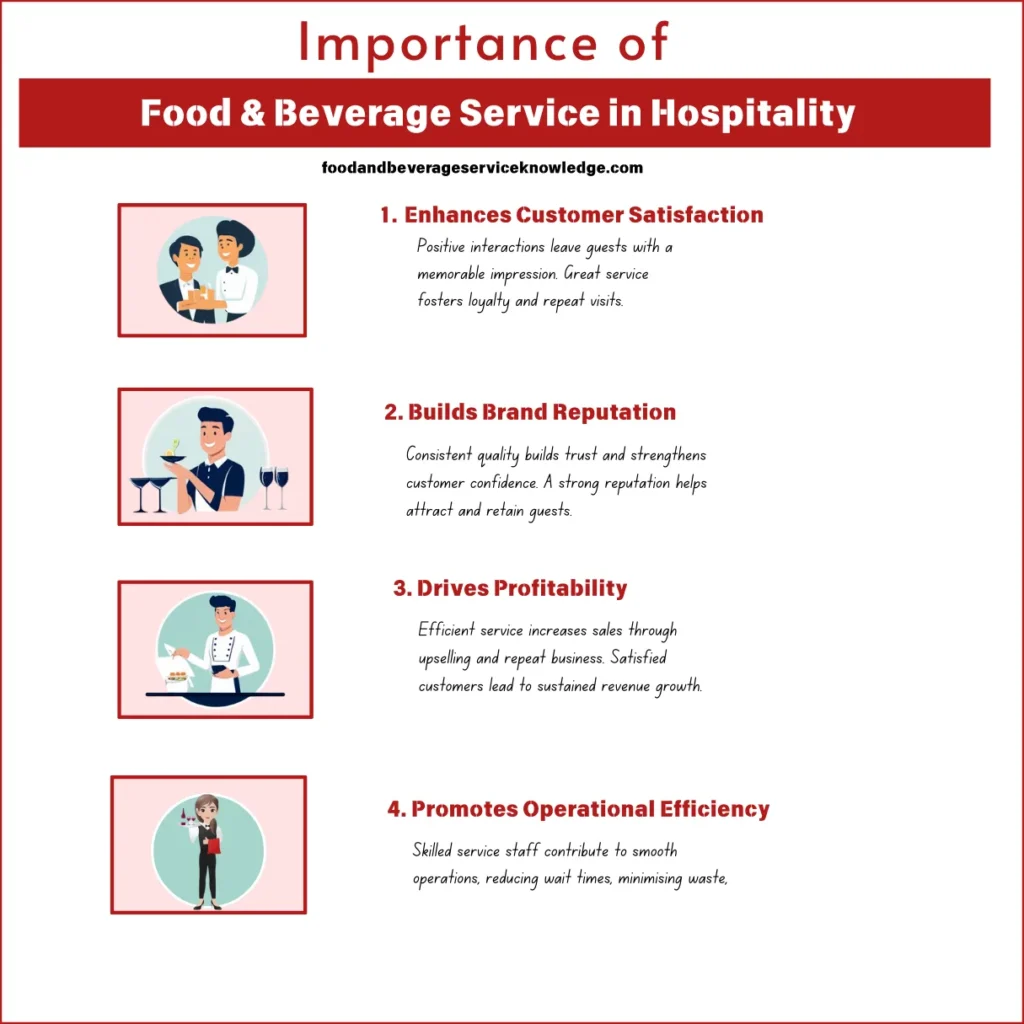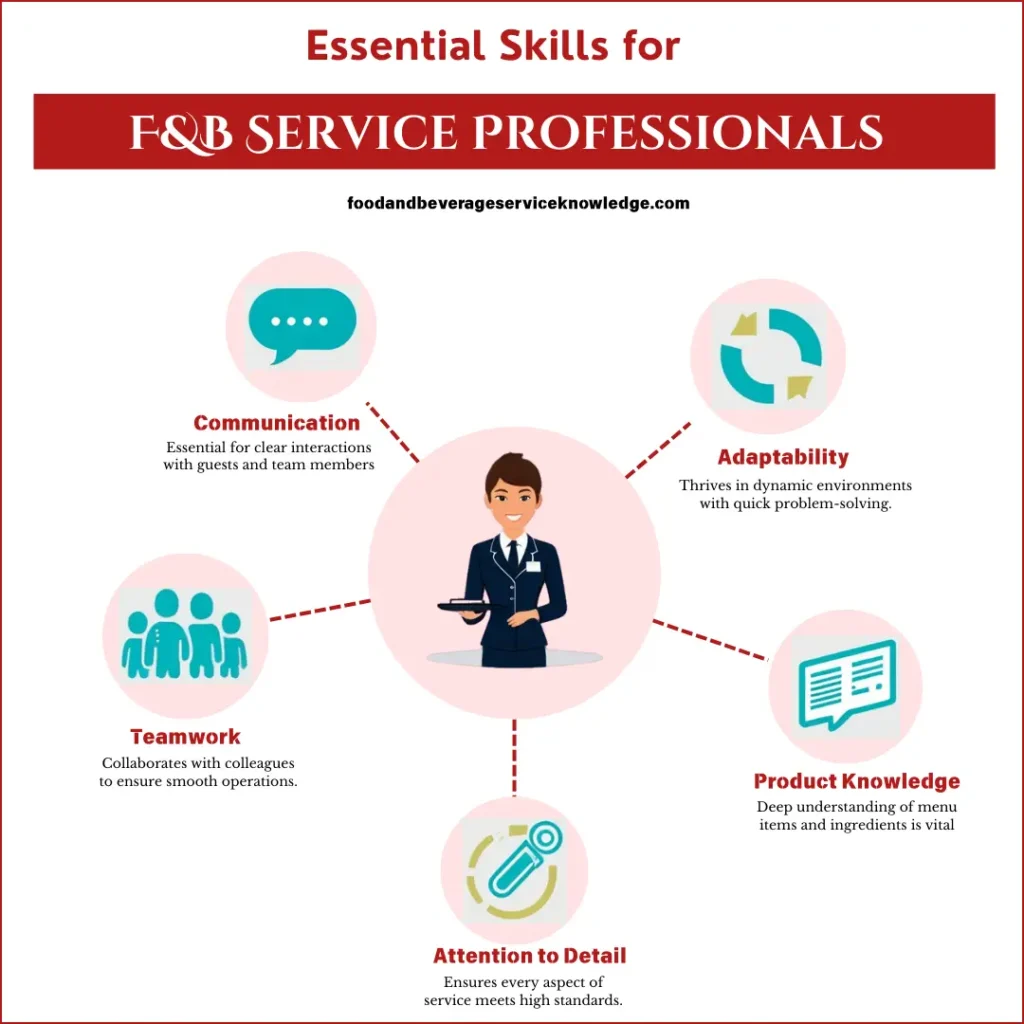In the world of hospitality, the dining experience plays a crucial role in customer satisfaction. Whether in a luxury hotel, a bustling café, or a fine-dining restaurant, quality service makes all the difference. But what is food and beverage service, and why is it so essential in the hospitality industry?
The Food and Beverage Service Department plays a vital role in the hospitality industry, shaping guest experiences through thoughtful menu planning, skilled staff coordination, and outstanding service delivery.
It ensures that every meal and beverage is served with precision, professionalism, and care.
By reading this article, you’ll gain a comprehensive understanding of food and beverage service, including its types, key aspects, and the roles and skills required. Whether you’re new to the industry or looking to refine your knowledge, this guide will help you navigate the essential elements of F&B service.
Importance of Food and Beverage Service
Food and beverage service is a cornerstone of the hospitality industry, playing a vital role in both customer satisfaction and business success. Its importance can be understood from several perspectives:

- Enhances Guest Experience: High-quality service creates a lasting impression on guests. It’s not just about serving food—it’s about delivering comfort, warmth, and professionalism that turns a meal into an experience.
- Drives Business Revenue: Effective F&B service encourages repeat visits, positive reviews, and word-of-mouth marketing. Upselling, timely service, and product knowledge can significantly increase a business’s profit margins.
- Supports Brand Reputation: Consistent, excellent service reflects a brand’s values and standards. A well-run F&B team helps maintain a strong reputation, especially in hotels, resorts, and upscale restaurants.
- Encourages Customer Loyalty: Personalised service and attention to detail build strong relationships with guests. Loyal customers are more likely to return and recommend the service to others.
- Promotes Operational Efficiency: Skilled service staff contribute to smooth operations, reducing wait times, minimising waste, and ensuring a better workflow between front-of-house and kitchen teams.
- Boosts Employee Morale: A well-trained and appreciated F&B team feels more confident and motivated, which directly impacts service quality and customer interactions.
For additional context, visit the Hospitality Industry page on Wikipedia. It offers an overview of the industry’s main sectors—lodging, food and beverage, recreation, and travel—and explains how these areas interconnect to shape the global hospitality experience.
Types/Examples of Food and Beverage Service
Food and beverage service styles differ based on formality, guest interaction, and setting. Each type offers a unique dining experience and requires specific service techniques.
1. Table Service
This is a traditional and formal method where guests are seated and served at their table by staff. It emphasises personalised attention and refined presentation.
Examples:
- Silver Service – Food is served from platters using service cutlery.
- American/Plate Service – Pre-plated dishes are served directly to the guest.
- French Service – Elegant style where food is served or prepared tableside.
Learn more about table service: Sequence of Service in Restaurants: Steps of Table Service in Fine Dining
2. Buffet Service
In buffet service, a variety of dishes are laid out, allowing guests to serve themselves. It’s ideal for large groups and offers flexibility in food choices.
Examples:
- Hotel Breakfast Buffets
- Wedding or Corporate Event Buffets
3. Counter/Bar Service
This style involves guests ordering and receiving food or drinks directly at a counter or bar. It’s fast-paced and common in casual or quick-service venues.
Examples:
- Coffee Shops and Cafés
- Fast Food Restaurants
- Bars and Pubs
4. Room Service
Room service delivers meals and beverages to guests’ rooms, providing convenience and privacy. It is most common in hotels and luxury resorts.
Examples:
- Standard Room Delivery – Orders are brought directly to the room.
- Trolley Service – Meals are presented and sometimes set up using a trolley.
5. Self-Service
In self-service settings, guests help themselves to food and drinks. This method is efficient and suitable for high-volume, casual environments.
Examples:
- Cafeterias and Food Courts
- Office or School Canteens
6. Outdoor/Catering Service
This type involves serving food and beverages outside the regular establishment, often at events. It requires adaptability and strong coordination.
Examples:
- Wedding Catering
- Festival Food Stalls
- Corporate Event Catering
Read our complete guide on: Types of Food and Beverage Service: A Complete Guide for the Hospitality
Key Aspects of Food and Beverage Service
Food and beverage service is more than just delivering meals—it involves multiple interconnected elements that ensure a smooth, satisfying, and memorable guest experience. Below are some of the core aspects that define quality F&B service:
1. Guest Satisfaction
The primary goal of F&B service is to meet and exceed customer expectations. Friendly service, attention to detail, and prompt responses to guest needs contribute to overall satisfaction and encourage repeat visits.
2. Menu Planning and Presentation
A well-designed menu reflects the establishment’s identity and target audience. Presentation, portion sizes, and variety play a big role in appealing to customers and enhancing their dining experience.
3. Hygiene and Safety Standards
Maintaining cleanliness, food safety, and hygiene is essential. Staff must follow strict protocols for food handling, personal hygiene, and sanitising service areas to ensure guest health and compliance with regulations.
4. Service Efficiency and Timing
Timely service, smooth coordination between the kitchen and front-of-house, and minimising guest wait times are crucial. Efficiency directly affects customer satisfaction and table turnover.
5. Staff Training and Conduct
Well-trained staff with strong communication and service skills are the backbone of successful F&B operations. Their professionalism, attitude, and product knowledge influence the guest’s overall impression.
6. Ambience and Environment
The setting where food is served—lighting, music, decor, table setup—contributes to the guest’s dining experience. A comfortable and welcoming environment enhances the quality of service.
7. Technology Integration
Modern F&B services often incorporate digital systems like POS (Point of Sale), online ordering, and table reservation software. These tools streamline operations and improve service accuracy.
Roles and Responsibilities in Food and Beverage Service
The Food and Beverage Service department relies on the coordination and expertise of various roles to ensure smooth operations and high-quality service. Each staff member has specific duties that contribute to the overall guest experience. Below are the key roles and their responsibilities:
1. F&B Manager
The F&B Manager oversees the entire food and beverage operation, ensuring that both front-of-house and back-of-house functions run efficiently. They are responsible for setting service standards, managing staff, controlling inventory, and ensuring customer satisfaction.
Responsibilities:
- Developing and implementing service protocols and standards
- Managing budgets, costs, and profit margins
- Supervising and training staff
- Handling customer complaints and resolving issues
- Ensuring health and safety compliance
2. Restaurant/Bar Supervisor
The supervisor assists the F&B manager by directly overseeing the daily operations of the dining area or bar. They supervise the staff, ensure customer satisfaction, and maintain a smooth flow of service.
Responsibilities:
- Coordinating the service team for seamless operations
- Handling guest queries and complaints
- Training and guiding new staff members
- Ensuring cleanliness and hygiene standards are met
- Monitoring service timing and ensuring timely food delivery
3. Waitstaff/Servers
Waitstaff are the face of the restaurant, directly interacting with guests and ensuring they have an enjoyable dining experience. They are responsible for taking orders, delivering food and drinks, and ensuring guests are satisfied throughout their meal.
Responsibilities:
- Greet guests and take orders
- Serving food and beverages accurately
- Providing menu recommendations and answering questions
- Ensuring a clean and comfortable dining area
- Handling payments and processing bills
4. Bartender
Bartenders prepare and serve drinks, interacting with customers at the bar. They also manage the bar’s inventory and ensure drinks are served according to the establishment’s standards.
Responsibilities:
- Mixing and serving alcoholic and non-alcoholic drinks
- Engaging with customers and making drink recommendations
- Managing bar inventory and restocking supplies
- Maintaining cleanliness and organisation of the bar area
- Ensuring responsible alcohol service and adhering to local regulations
5. Host/Hostess
The host or hostess is responsible for greeting and seating guests as they arrive. They manage reservations, maintain waitlists, and ensure guests are seated in a timely and pleasant manner.
Responsibilities:
- Greeting guests and escorting them to their tables
- Managing reservations and waitlists
- Answering phones and providing information
- Ensuring a smooth and welcoming atmosphere upon arrival
- Coordinating with servers to ensure efficient seating
6. Food Runner
Food runners assist in transporting dishes from the kitchen to the dining area. They ensure that the correct orders are delivered promptly to the correct tables.
Responsibilities:
- Delivering food from the kitchen to customers efficiently
- Ensuring food is presented attractively and in accordance with service standards
- Assisting in clearing dirty dishes and setting up new tables
- Communicating with kitchen staff to resolve order discrepancies
7. Kitchen Staff (Chefs, Cooks, and Kitchen Assistants)
Although not always part of the direct service team, kitchen staff plays a critical role in food and beverage service. They prepare meals to meet the standards expected by the customers and collaborate with waitstaff to ensure timely service.
Responsibilities:
- Preparing and cooking food to order
- Ensuring food presentation meets the establishment’s standards
- Following food safety and hygiene guidelines
- Managing inventory and food storage
- Collaborating with the service staff to ensure accurate orders
Skills and Qualifications Required for Food and Beverage Service
A career in food and beverage service demands a combination of practical skills, interpersonal abilities, and specific qualifications to ensure high-quality service and operational efficiency. Below are the essential skills and qualifications required to excel in this field:

1. Communication Skills
Strong verbal communication is essential for interacting with guests, taking orders, and working as part of a team. Being able to clearly and politely convey information ensures smooth operations and helps avoid misunderstandings.
Key Points:
- Active listening to understand the guest’s needs
- Clear articulation when taking orders or explaining the menu
- Handling guest complaints diplomatically
2. Customer Service Orientation
Providing excellent customer service is at the core of F&B operations. Professionals need to be attentive, courteous, and proactive in addressing guest needs to ensure a positive dining experience.
Key Points:
- Anticipating guest needs and exceeding expectations
- Being friendly, approachable, and professional
- Responding quickly to guest complaints and resolving issues effectively
3. Organisational Skills
Food and beverage service can be fast-paced, so being organised is crucial. Employees must manage multiple tasks simultaneously while ensuring efficiency and accuracy.
Key Points:
- Multitasking effectively without compromising service quality
- Keeping track of orders, reservations, and customer preferences
- Managing time to ensure timely service delivery
4. Attention to Detail
Paying attention to small details, such as presentation, cleanliness, and accuracy in orders, can greatly enhance the guest experience and ensure high service standards.
Key Points:
- Ensuring food is served according to customer requests and preferences
- Monitoring the cleanliness of dining areas and ensuring proper table setups
- Double-checking orders for accuracy
5. Knowledge of Food and Beverages
A solid understanding of the menu, food preparation techniques, and beverages is vital for recommending items to guests and answering any questions about the offerings.
Key Points:
- Familiarity with the menu and ingredients
- Knowledge of wine pairings and beverage options
- Understanding dietary restrictions, allergies, and special requests
6. Physical Stamina
Food and beverage service often involves standing for long hours, carrying heavy trays, and maintaining a high level of energy during peak service times. Stamina and physical endurance are key for the role.
Key Points:
- Ability to stand, walk, and carry items for extended periods
- Physical coordination to balance trays and move efficiently
- Managing physical tasks without compromising service quality
7. Teamwork and Collaboration
In food and beverage service, teamwork is essential for smooth operations. Professionals must be able to work in harmony with kitchen staff, other servers, and management to ensure a seamless experience for guests.
Key Points:
- Cooperating with colleagues and assisting where needed
- Coordinating service with the kitchen and other departments
- Communicating effectively with other team members during busy hours
8. Problem-Solving Abilities
Food and beverage professionals often encounter challenges, from dealing with difficult customers to handling order mistakes. Strong problem-solving skills allow staff to handle these situations calmly and efficiently.
Key Points:
- Quickly resolving customer complaints or service issues
- Thinking on your feet when facing unexpected situations
- Managing conflicts between customers or staff in a professional manner
Qualifications:
While skills are paramount, certain qualifications can help individuals excel in food and beverage service. These may include:
1. Educational Qualifications
- A high school diploma is typically the minimum requirement for entry-level positions.
- Postsecondary education, such as a diploma or degree in Hospitality Management, Culinary Arts, or Hotel Management, can be advantageous for managerial roles.
2. Certifications
- Food Safety and Hygiene Certifications (e.g., ServSafe, HACCP) are essential for maintaining health standards.
- Bartending or Sommelier Certifications may be required for specialised roles like bartenders or wine experts.
3. Previous Experience
While formal education is helpful, many positions in food and beverage service also value practical experience. Entry-level jobs can provide hands-on learning opportunities, while advanced roles may require prior experience in supervisory or management positions.
Conclusion
Food and beverage service is essential to the hospitality industry, directly influencing customer satisfaction and business success. Whether it’s table service, buffet, or self-service, each style plays a key role in shaping guest experiences. The success of this service relies on skilled professionals who possess strong communication, organisational, and customer service skills.
With the right qualifications and dedication, individuals in the F&B service industry can provide memorable dining experiences, contributing to both personal and professional growth in a thriving field.
This article was written by Saswata Banerjee, the creator of Food and Beverage Service Knowledge, based on 8+ years of experience in the hospitality industry.


